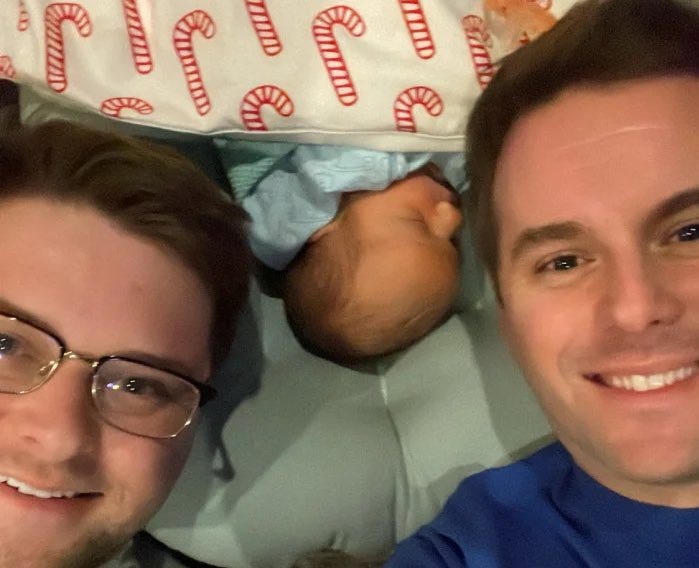I understand Guy Benson’s silence.
Several weeks ago, the Fox commentator posted a picture on social media announcing the birth of his son, Konrad. In the picture, Guy and his partner smile while the newborn snuggles beneath a blanket with candy cane images on it. The image is charming and innocent, a keepsake for one of the happiest days in their lives.
But that didn’t stop the haters.
The picture lit the tiki torches of rightwing X (formerly known as Twitter). While some congratulated Guy, others attacked him and his partner for “buying a baby,” “stealing a baby from its mother,” “child abuse,” and “wanting a baby as an accessory.” Some raised good-faith questions about IVF and surrogacy, but much of the rhetoric was just vile.
Despite his large platform, Guy didn’t push back on any of it. He ignored it. In fact, he tweeted more about antisemitism than about the bigotry directed at his own family.
I understand why. At best, speaking on these issues puts you in a position of having to litigate your parenting decisions. You then have to explain how surrogacy and IVF work, which is treacherous on a public forum. Many people know little about these processes but nonetheless have strong views. Then there are the trolls. Even if most people are sane, talking about these issues on a platform like X exposes you and your children to the worst trolls on the planet.
I understand these reasons because my son was born through surrogacy like Guy’s baby. Whenever this type of rhetoric has flared up, I too have remained silent. But this time, after witnessing the attacks on Guy, I felt I had to say something in my own small way.
My pushback was directed at a handful of “trad” Catholic intellectuals. These guys were mutuals of mine who nonetheless used the language of “buying babies” and “deliberately creating orphans” while condemning surrogacy and IVF. I respectfully encouraged them to reconsider their rhetoric while “agreeing to disagree” with their religious views on the matter. To my dismay, they ignored my nudge and doubled down.
Their lack of consideration felt personal, and at that point my communication with them went south. It became clear they had neither an understanding of IVF or surrogacy nor a genuine desire to learn about it. It was also obvious they had never interacted with gay or infertile parents or their children. On top of that, their logic was not particularly well-thought-out and contradicted their takes on some other issues like, say, abortion.
To be sure, there are valid moral issues to consider. I spent two years working through these issues before embarking on my parenting journey. Why not adoption instead of surrogacy? Why bring a child into the world without a mom? What about leftover embryos? And so on. I thought deeply about these things and drew my own conclusions. I still respect other views on these issues, particularly when informed by religious beliefs. On the other hand, if someone accuses me of “buying my child” or “engaging in child abuse” or some such nonsense, they can buzz right off. That language is a conversation-stopper, as it would be for any parent.
After these interactions on X, I was worked up for a few days. I was upset by what I perceived as unnecessary cruelty in the name of defending children. I felt protective of children like my son, parents like Guy, and heterosexual couples struggling with infertility, who I knew were observing these interactions in silence. Dad-warrior energy consumed me. I wanted to paint my face and beat drums. I wanted to tomahawk these guys into submission. Visit the gay dad Facebook group and learn about these people before saying this nonsense, or else I’m taking your scalp! Righteous anger is a dangerous elixir, and I was drunk on it.
Then I went to a meeting at the church, and my warrior energy turned to sadness. I entered the meeting ferocious on the inside but friendly on the outside. As it proceeded, though, my solid state began to liquify. I tried to hold it together, but I knew I’d lost that battle when a friend discreetly handed me two tissues. I took them and said thanks. I explained that I had waged into a political discussion that felt personal. My friend listened, then patted me on the shoulder.
A few minutes later, I excused myself and walked down the church hallway. I felt lighter for sharing. The tropical storm had passed; the sadness and warrior energy were gone.
In the church corridor, beneath gothic arches, a relief of Mary with Jesus caught my eye. I walked over and studied it. Their bodies were carved in white against a blue background. Halos shimmered above serene expressions. I noticed the way Mary held her son, one arm around his waist and another holding his ankle as he sat on her lap.
This was in early December, and the Madonna made me think of Christmas, the time of year when we celebrate the birth of Jesus. As I studied the relief, a realization struck me like football stadium lights turning on at night. For the first time in my life, I internalized how Jesus was born. Words took shape in my mind: Jesus, the divine surrogate child.
I took a deep breath and marveled. I thought of Guy Benson’s newborn, my six-year-old, and the millions of other kids born in unconventional ways. I thought of their parents too. All divine images.
I thought of the haters, too, and felt a little smug. How could they not realize how Jesus was born?
I returned to the meeting feeling like a warm, fragrant candle had been lit in my soul. From that moment on, it felt like Christmas.
##







Great piece. When a solid state begins to liquify, it can be called “goo.” You can’t spell good without goo. This goo-d has been seen and yearned for by some for more than a decade. Your writing is powerfully good.
Thank you for being here, Jeff.